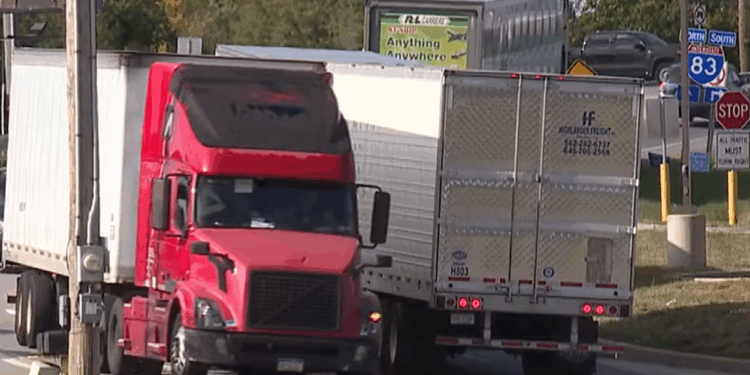Pennsylvania will lose $75 million in federal roads funds unless it gets into compliance with U.S. Department of Transportation (DOT) licensing requirements for non-domiciled commercial learner’s permits (CLP) and non-domiciled commercial driver’s licenses (CDL). That is according to an alarming letter DOT sent Wednesday to Pennsylvania Department of Transportation (PennDOT) Secretary Mike Carroll and Gov. Josh Shapiro.
The threatened loss of funding comes on the heels of the recent Kansas arrest of an illegal alien wanted in Uzbekistan for belonging to a terrorist organization, according to ICE. As The Federalist previously reported, the alleged terrorist Akhror Bozorov was issued a non-domiciled CDL in Pennsylvania.
Non-domiciled licenses are issued to drivers who are in the United States legally, and they are supposed to expire when the license holder’s time in the U.S. expires. PennDOT issued Bozorov a Real ID non-domiciled CDL expiring in 2029, but he should not have had one at all.
The Federal Motor Carrier Safety Administration (FMCSA) has found that “PennDOT issued non-domiciled CDLs that extend beyond the expiration of drivers’ lawful presence in the U.S, issued non-domiciled CDLs without requiring the non-domiciled driver to comply with the standards for providing proof of lawful presence, and issued non-domiciled CDLs to lawful permanent residents who were eligible for a regular CDL,” the letter reads.
“This letter constitutes FMCSA’s preliminary determination that Pennsylvania has failed to meet the requirement for substantial compliance with the standards for issuing non-domiciled CLPs and CDLs. Pennsylvania must take immediate corrective action … to address the deficiencies identified in this letter. The State’s failure to do so may result in FMCSA initiating the withholding of certain Federal-aid highway funds and decertifying the State’s CDL program.”
The FMCSA discovered the state is out of compliance as part of its Annual Program Review, which started in September. States are required to be in “substantial compliance” with certain federal regulations, and the FMCSA’s annual review “evaluates all aspects of a State’s CDL program.”
When issuing non-domiciled CLPs and CDLs, states may only accept, “as valid proof of lawful presence (i) an unexpired employment authorization document … issued by United States Customs and Immigration Service … or (ii) an unexpired foreign passport accompanied by an approved I-94 form documenting the driver’s most recent admittance into the United States.”
PennDOT has issued 12,436 non-domiciled CLPs or CDLs that are currently unexpired.
During the review, FMCSA “sampled 150 records of drivers issued a non-domiciled CDL.” Of those, two records were given dates that “exceeded the expiration date found on the driver’s lawful presence document.” In four cases, PennDOT showed “no evidence” that it required drivers to provide proof of lawful presence in the U.S. And in two cases, PennDOT “issued a non-domiciled CDL to lawful permanent residents of the United States, who are eligible for regular CDLs.”
For example, on July 8, 2025, PennDOT gave a non-domiciled CDL to a citizen of Ukraine, using the Form 1-94 and a passport set to expire on Aug. 15, 2025, along with an employment authorization document that expired on July 31, 2025. At the time he requested the license, he had 23 days left before his work authorization expired. PennDOT issued a non-domiciled CDL expiring July 31, 2026, giving him an improper extra year of licensing.
On June 12, 2025, PennDOT issued a non-domiciled CDL (expiration date Jan. 10, 2029), but PennDOT could not show that it had seen proper documentation. This was true of several other drivers who presented the wrong documentation: PennDOT has no record of acceptable documents, but the drivers left with a license.
FMCSA determines that Pennsylvania must: Conduct an internal audit and find every non-domiciled license that PennDOT issued in violation of federal regulations; “void or rescind all unexpired noncompliant” licenses and remove unqualified drivers from the road; share the audit findings and “the number of unexpired noncompliant non-domiciled CLPs and CDLs” with FMCSA.
PennDOT may resume issuing such licenses only after voiding or rescinding all bad CLPs and CDLs and addressing the internal issues that allowed this to happen.
Pennsylvania has “30 calendar days to respond to the preliminary determination explaining the State’s corrective action or … why FMCSA’s preliminary determination is incorrect. If FMCSA makes a final determination of substantial noncompliance, FMCSA may initiate the withholding of certain Federal-aid highway funds.”
Pennsylvania risks losing up to approximately $75.5 million for fiscal year 2027. If it remains substantially noncompliant beyond the first fiscal year, FMCSA may withhold up to 8 percent of these funds, meaning Pennsylvania then “risks losing up to approximately $151 million” in road funding “in the second and subsequent FY(s) of noncompliance. Once funds are withheld following a substantial noncompliance determination, they are no longer available for apportionment to Pennsylvania,” the letter said.
The FMCSA could also decertify the state’s CDL program. If decertified, Pennsylvania would be prohibited from “issuing, renewing, transferring, or upgrading CLPs and CDLs.”
Beth Brelje is an elections correspondent for The Federalist. She is an award-winning investigative journalist with decades of media experience.
















